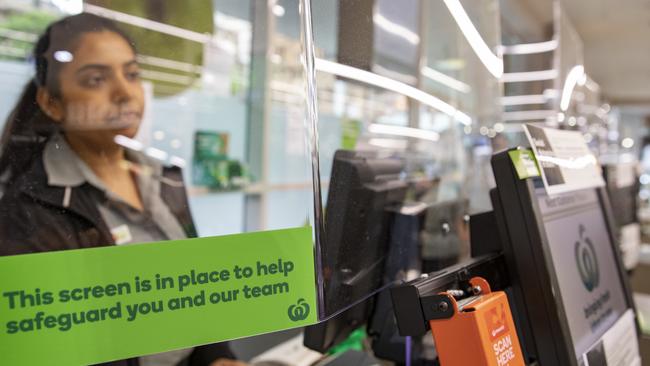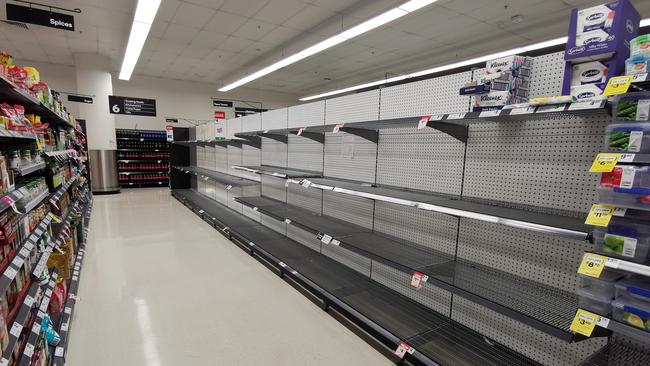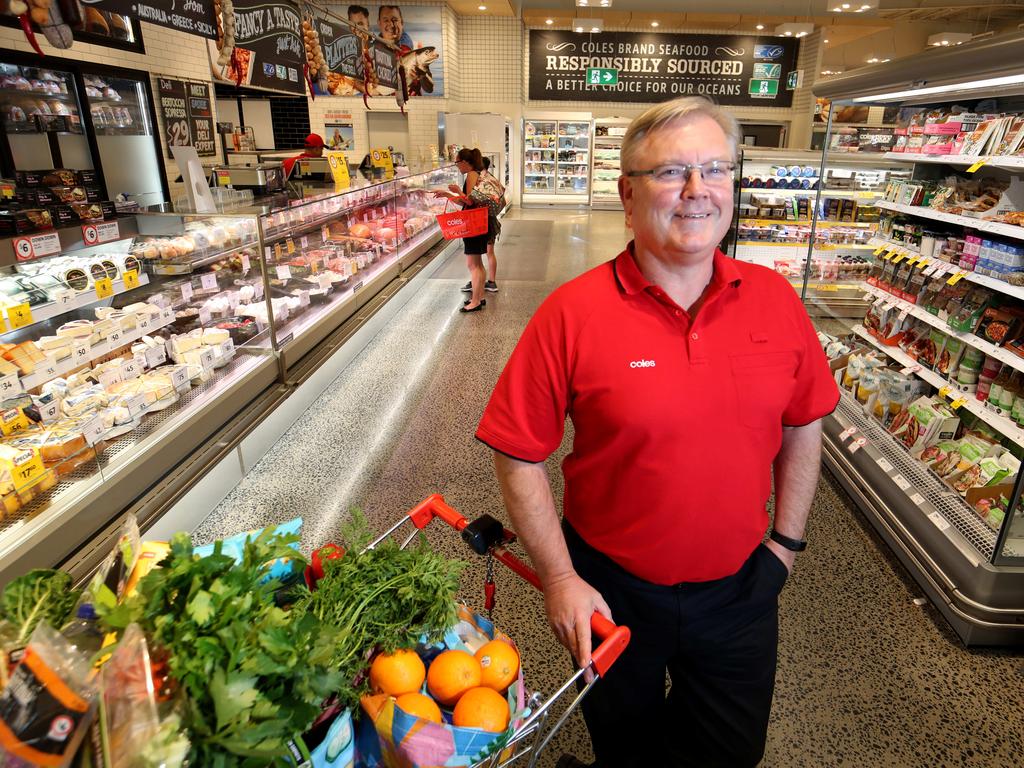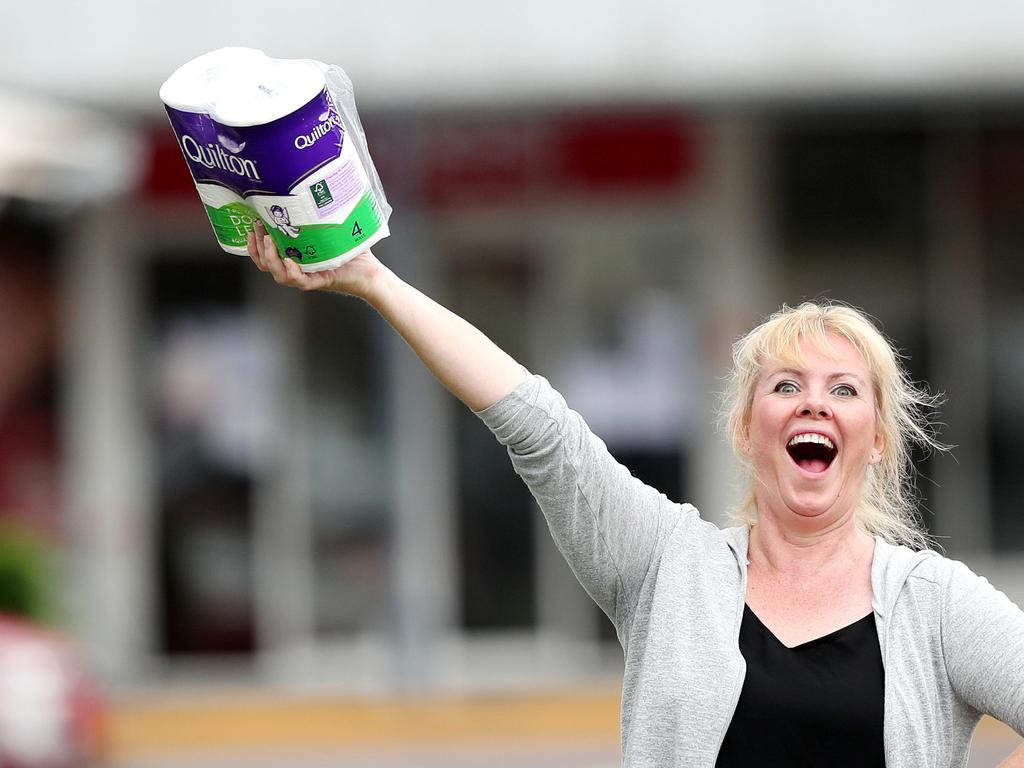Coronavirus costs weighing on Woolworths
After a brief boost from panic-buying, Woolworths is bracing for tougher times as coronavirus costs hit its operations.

Woolworths is bracing for a more challenging medium-term economic outlook in the wake of the coronavirus pandemic, as the supermarket giant incurs costs to cope with the health crisis.
Those costs including the closure of all its hotels, generating losses of up to $35 million a month since March.
The supermarkets group also said it was facing up to $275m in incremental costs as it reacts to the health crisis, incorporating costly new cleaning and other work practices and taking on thousands of new staff to deal with big shifts in consumer behaviour.
The nation’s biggest supermarket confirmed the strength of panic-buying through March and April at its supermarkets, with sales up more than 10 per cent.
Total sales across the Woolworths group for the third quarter rose 10.7 per cent to $16.5 billion. Group online sales rocketed by 34 per cent to $817 million.
Like Coles, shoppers stripped essential products from Woolworths shelves, contributing a record 11.3 per cent rise in food sales at its Australian supermarkets to $11.171 billion.
Like-for-like sales at Australian supermarkets were also up a record 10.3 per cent for the third quarter.
The strong growth in supermarket sales fell slightly short of Coles, which on Wednesday reported same store sales growth of 13.1 per cent for the quarter.
“The last four months have been one of the most challenging periods in the history of Woolworths,’’ said Woolworths chief executive Brad Banducci.
“The COVID-19 crisis is far from over, but we are hopeful that we are now settling into a ‘new normal’ and are confident that we will get through this together.”
Woolworths said New Zealand supermarket comparable sales were up 14.8 per cent. It’s long-struggling Big W chain reported a 9.9 per cent lift in comparable store sales to $866m, although there was an adverse change in product mix being sold as home essentials, leisure and toys performed well, while apparel sales declined in March. The category mix changes resulted in higher average selling prices but are typically in lower margin categories, Woolworths said.
Online sales rose by 73 per cent as many people staying in their homes opted for home delivery.

Woolworths’ hotels and drinks business, housed within its newly-created Endeavour Group arm, suffered as pubs and hotels were shut in March due to the pandemic. Its hotels arm is now churning out losses of between $30 million and $35 million a month as the venues remain closed.
Endeavour Drinks, which runs the liquor stores Dan Murphy’s and BWS, saw total sales rise 9.5 per cent in the third quarter to $2.3 billion with like-for-like sales up 8.9 per cent. January and February sales were subdued and impacted by low market growth due to weather and bushfires, but demand surged in late March as home isolation began. That demand has now moderated.
With hotels closing on March 23 following federal government directives, sales in the first 11 weeks of the quarter increased by 3.2 per cent with like-for-like sales up 2.4 per cent. Overall, with the pubs shut, sales for the quarter plummeted by 12.9 per cent.
“Group sales growth for the quarter was strong across all businesses apart from hotels following the mandatory closure due to government restrictions in late March,” Mr Banducci said.
“After a slower start to the quarter, Australian and New Zealand food sales increased materially from late February due to pantry-loading and more recently with customers eating more at home.
“Endeavour Drinks sales also surged towards the end of the quarter. While already trading well in January and February, Big W’s sales growth also accelerated in March, although the sales mix shifted towards lower-margin everyday needs and leisure.”
Turning to the outlook, Woolworths said sales had started to moderate into April and the retailer was facing bloated costs such as hiring thousands of new staff and implementing new hygiene practices. This would be met by a tougher economic environment into 2020.
“Sales growth across the group has continued in April although growth rates have moderated relative to March. Australian food sales growth in the first three weeks of April is in the mid-single digits with drinks sales growth broadly back to pre- COVID-19 levels. The rate of sales growth for the remainder of the financial year is very difficult to predict at this stage,’’ Woolworths said.
Incremental costs have also been incurred for cleaning, security and safety equipment.
Looking forward to the fourth quarter, a number of costs are expected to continue for the rest of the quarter, this includes costs associated with the temporary employment of approximately 22,000 new staff, additional warehouse capacity and expanding home delivery.
“ In Q4, these incremental costs are expected to be in the range of $220 - $275 million for the group (excluding hotels). The extent to which these costs can be offset for the remainder of the financial year will depend on the rate of sales growth and required level of safety settings.
“Hotels will make a loss before interest and tax of $30 - $35 million per month (including March) while the business remains closed.
“Big W sales have remained strong, but the sales mix has changed with customers buying more everyday needs and leisure products. In the second half, Big W will also be impacted by incremental costs due to COVID-19 and higher online fulfilment costs. Inventory health remains strong at this stage but continues to be closely monitored.”
Woolworths says the longer-term impact of the crisis is uncertain, but in the likely event of a more challenging medium-term economic environment, the group remains well positioned through its focus on food, everyday needs, convenience and value.







To join the conversation, please log in. Don't have an account? Register
Join the conversation, you are commenting as Logout